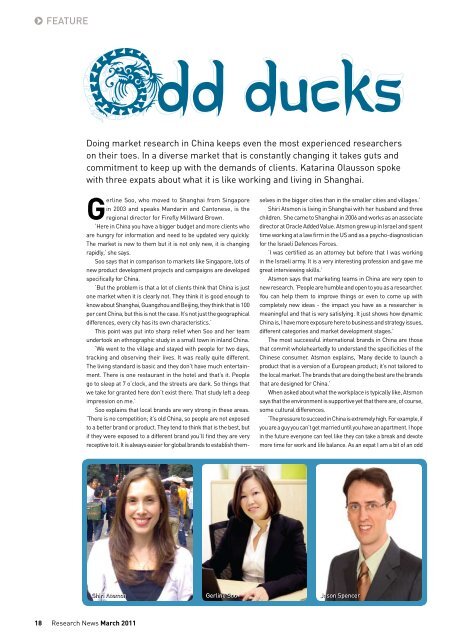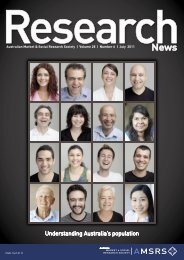Asia Pacific region - aprc-research
Asia Pacific region - aprc-research
Asia Pacific region - aprc-research
You also want an ePaper? Increase the reach of your titles
YUMPU automatically turns print PDFs into web optimized ePapers that Google loves.
FEATURE<br />
fdd ducks<br />
Doing market <strong>research</strong> in China keeps even the most experienced <strong>research</strong>ers<br />
on their toes. In a diverse market that is constantly changing it takes guts and<br />
commitment to keep up with the demands of clients. Katarina Olausson spoke<br />
with three expats about what it is like working and living in Shanghai.<br />
Gerline Soo, who moved to Shanghai from Singapore<br />
in 2003 and speaks Mandarin and Cantonese, is the<br />
<strong>region</strong>al director for Firefly Millward Brown.<br />
‘Here in China you have a bigger budget and more clients who<br />
are hungry for information and need to be updated very quickly.<br />
The market is new to them but it is not only new, it is changing<br />
rapidly,’ she says.<br />
Soo says that in comparison to markets like Singapore, lots of<br />
new product development projects and campaigns are developed<br />
specifically for China.<br />
‘But the problem is that a lot of clients think that China is just<br />
one market when it is clearly not. They think it is good enough to<br />
know about Shanghai, Guangzhou and Beijing, they think that is 100<br />
per cent China, but this is not the case. It’s not just the geographical<br />
differences, every city has its own characteristics.’<br />
This point was put into sharp relief when Soo and her team<br />
undertook an ethnographic study in a small town in inland China.<br />
‘We went to the village and stayed with people for two days,<br />
tracking and observing their lives. It was really quite different.<br />
The living standard is basic and they don’t have much entertainment.<br />
There is one restaurant in the hotel and that’s it. People<br />
go to sleep at 7 o’clock, and the streets are dark. So things that<br />
we take for granted here don’t exist there. That study left a deep<br />
impression on me.’<br />
Soo explains that local brands are very strong in these areas.<br />
‘There is no competition; it’s old China, so people are not exposed<br />
to a better brand or product. They tend to think that is the best, but<br />
if they were exposed to a different brand you’ll find they are very<br />
receptive to it. It is always easier for global brands to establish themselves<br />
in the bigger cities than in the smaller cities and villages.’<br />
Shiri Atsmon is living in Shanghai with her husband and three<br />
children. She came to Shanghai in 2006 and works as an associate<br />
director at Oracle Added Value. Atsmon grew up in Israel and spent<br />
time working at a law firm in the US and as a psycho-diagnostician<br />
for the Israeli Defences Forces.<br />
‘I was certified as an attorney but before that I was working<br />
in the Israeli army. It is a very interesting profession and gave me<br />
great interviewing skills.’<br />
Atsmon says that marketing teams in China are very open to<br />
new <strong>research</strong>. ‘People are humble and open to you as a <strong>research</strong>er.<br />
You can help them to improve things or even to come up with<br />
completely new ideas - the impact you have as a <strong>research</strong>er is<br />
meaningful and that is very satisfying. It just shows how dynamic<br />
China is, I have more exposure here to business and strategy issues,<br />
different categories and market development stages.’<br />
The most successful international brands in China are those<br />
that commit wholeheartedly to understand the specificities of the<br />
Chinese consumer. Atsmon explains, ‘Many decide to launch a<br />
product that is a version of a European product; it’s not tailored to<br />
the local market. The brands that are doing the best are the brands<br />
that are designed for China.’<br />
When asked about what the workplace is typically like, Atsmon<br />
says that the environment is supportive yet that there are, of course,<br />
some cultural differences.<br />
‘The pressure to succeed in China is extremely high. For example, if<br />
you are a guy you can’t get married until you have an apartment. I hope<br />
in the future everyone can feel like they can take a break and devote<br />
more time for work and life balance. As an expat I am a bit of an odd<br />
Shiri Atsmon Gerline Soo Jason Spencer<br />
18 Research News March 2011





